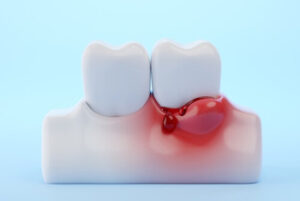Dental veneers are a popular cosmetic solution that can transform your smile by addressing various dental issues, such as discoloured, misshapen, or chipped teeth. But can you get veneers with gum disease?
If you suffer from gum disease, you might be concerned about whether veneers are still viable. In this comprehensive guide, we’ll explore whether gum disease invalidates the possibility of getting veneers, examine the different types of veneers available, discuss what to expect if you have receding gums, and provide tips on selecting the ideal dental clinic for your veneer treatment.
Understanding Gum Disease
Before determining whether veneers can be placed when you have gum disease, it’s important to understand what it entails and how it impacts your overall oral health.
Gum disease, also known as periodontal disease, encompasses a range of conditions that affect the mouth’s soft tissues. It begins with mild inflammation and can progress to more severe forms that impact the underlying bone structure. Understanding these conditions can help in assessing the feasibility of veneer treatments.
Gingivitis

- Symptoms: Swollen gums, bleeding during brushing, and bad breath.
- Recommendations: Professional cleanings and improved oral care.
Periodontitis
If gingivitis is left unaddressed, it can develop into periodontitis, a more severe form of gum disease. Periodontitis affects the deeper structures of the teeth, including the bone that supports the teeth. This condition can lead to gum recession, pockets between the teeth and gums, and tooth mobility.
- Symptoms: Deep pockets around teeth, gum recession, loose teeth, or tooth loss.
- Recommendations: Potential surgical interventions and rigorous oral hygiene.
Impact Of Gum Disease On Veneer Treatment
Gum disease can significantly affect the placement and success of dental veneers. Proper management of gum health is crucial for ensuring that veneers adhere well and perform optimally. Here’s why addressing gum issues before veneer placement is important:
- Healthy Gum Foundation: A healthy gum foundation is essential for successfully placing veneers. Unhealthy gums may not provide a stable surface for veneers, leading to complications such as worsening gum inflammation, poor adhesion, discomfort, and potential damage to the veneer bond. Ensuring your gums are healthy before veneer placement helps achieve the best outcomes.
- Long-Term Success: The longevity of veneers is closely tied to the health of the gums. Healthy gums provide a stable foundation for veneers, contributing to their durability and effectiveness. Addressing any gum issues beforehand ensures a more successful and lasting result.
Managing Gum Disease Before Getting Veneers
If you have gum disease and are considering veneers, your dentist will likely recommend a treatment plan to address the underlying gum issues before proceeding with veneer placement.
Here are some common steps involved in managing gum health before veneer treatment:
- Professional Cleaning: Professional dental cleaning is often the first step in treating gum disease. This procedure removes plaque and tartar buildup from tooth surfaces and roots, helping to reduce inflammation and promote gum tissue healing.
- Antibiotic Mouth Rinse: An antibiotic mouth rinse may be prescribed to control bacterial infections and reduce gum inflammation. This rinse helps to manage the bacterial load in the mouth, aiding in the restoration of gum health before veneer placement.
- Gum Surgery: In cases of severe gum disease, surgical dental interventions such as pocket reduction or soft tissue grafting may be necessary. These procedures aim to repair and regenerate damaged gum tissue, creating a healthier environment for veneer placement.
Types Of Veneers
Dental veneers are made of various materials, each with distinct benefits and considerations.
Understanding the different types of veneers can help you make an informed decision based on your dental needs and aesthetic goals.
Porcelain Veneers
Porcelain veneers, also called porcelain laminate veneers, are a popular choice due to their durability and natural appearance.
Made from high-quality ceramic material, porcelain veneers are custom-designed to fit over the front surface of your teeth, providing an amazing solution for a range of cosmetic issues, including misshapen teeth.
- Advantages Of Porcelain Veneers
- Durability: Porcelain veneers are highly resistant to staining and damage, making them a long-lasting option.
- Natural Look: They closely mimic the appearance of natural teeth, providing a seamless and aesthetically pleasing result.
- Considerations
- Cost: Porcelain veneers tend to be more expensive than composite veneers.
- Preparation: The process may involve some removal of tooth structure to accommodate the veneer.
Composite Veneers
Composite veneers are made from composite resin and are typically more affordable than porcelain veneers.
They are applied directly to the tooth surface and can be sculpted to achieve the desired shape and colour.
- Advantages Of Composite Veneers
- Cost-Effective: Composite veneers are generally less expensive, making them a budget-friendly option.
- Considerations
- Durability: Composite veneers may be less durable and more prone to staining than porcelain veneers.
- Maintenance: They may require more frequent touch-ups and replacements.
What To Consider When Obtaining Veneers With Receding Gums
If you have receding gums and are considering dental veneer treatments, it’s important to understand the process and what to expect.
Here’s a detailed overview of what you can anticipate during and after veneer placement.
Initial Consultation

Gum Health Assessment
A thorough assessment of your gum health will be conducted to determine the severity of any issues. If you have receding gums or other gum problems, your dentist may suggest measures to manage gum health before veneer placement.
Tooth Preparation
A small amount of tooth structure may be removed during this phase to create space for the veneer. If you have gum disease, this step may be adjusted based on the condition of your gums to ensure satisfactory fit and adhesion.
Impression
An impression or digital scan of your teeth is taken to create custom veneers that fit accurately. This step ensures that the veneers align well with your teeth and gums.
Bonding
After the veneers are ready, they are bonded to your teeth using dental cement. This step involves careful placement and adjustment to ensure a snug fit and a natural look.
Post-Treatment Care
Proper post-treatment care is essential for maintaining both your veneers and your overall gum health.
Continue practising good dental hygiene by brushing with fluoride toothpaste, flossing daily, and attending regular check-ups. This will help maintain healthy gums and ensure the longevity of your veneers.
Regular follow-up visits with your dentist may also help observe the condition of your veneers and gums. These appointments are crucial for dealing with any issues and ensuring your veneer treatment remains in good shape.
Finding The Ideal Dental Clinic For Veneers
Selecting a reputable dental clinic is crucial for ensuring successful veneer treatment, especially if you have gum disease.
Here are some key factors to consider when choosing a dental clinic:
- Experience And Credentials: Look for a dental clinic with experienced professionals who are experts in cosmetic dentistry and veneer treatments. Check their credentials and track record of successful veneer placements to ensure you receive high-quality care.
- Clinic Facilities: Evaluate the clinic’s facilities and technology to ensure they are equipped to handle advanced cosmetic procedures and gum health management. Modern equipment and technology can enhance the precision and success of veneer treatments.
- Patient Reviews: Reading patient reviews can provide insight into the quality of care provided by the clinic. Positive feedback from previous patients can help you make an informed decision about where to get your veneers.
Frequently Asked Questions
Can I get veneers if I have active gum disease?
It is crucial to address active gum disease before getting veneers. Your dental expert must manage your gum health to ensure the veneers adhere properly and function well in the long term.
How long does it take to prepare my gums for veneers?
The duration depends on the severity of your gum disease and the treatment required. Achieving optimal gum health may take several weeks to months before proceeding with veneer placement.
What should I do if I experience gum bleeding or swelling after getting veneers?
If you experience gum bleeding or swelling after getting veneers, it’s important to contact your dentist promptly. These symptoms could indicate a problem with the veneer placement or an issue with gum health that needs addressing. Early intervention can minimise further complications and ensure proper healing.
Can I get veneers if I have lost bone due to gum disease?
If you have lost bone due to gum disease, your dentist may recommend treatments such as bone grafting to restore the bone structure before placing veneers. Bone grafting helps create a stable veneer foundation and improves overall dental health.
What is the cost of dental veneers?
The cost of dental veneers can vary widely depending on factors such as the type of veneers (porcelain or composite), the complexity of the case, and the dental clinic’s location. Gum disease may increase the overall cost due to the additional treatments required to manage the condition before veneer placement. It’s essential to discuss the total cost and financing options with your dental professional to understand the complete financial commitment.
Closing Thoughts: Making The Ideal Choice For Your Veneer Treatment

By understanding the impact of gum disease on veneer treatments, exploring different veneer options, and following proper care procedures, you can achieve a beautiful smile with the added benefit of a healthy mouth.
If you’re considering dental veneers and have gum disease concerns, consult a qualified dental professional who can provide personalised advice and treatment options. With the right care and guidance, you can enjoy the benefits of veneers and a healthier, more confident smile.
Contact Dental 266 in Burwood, NSW, at 02 9051 0600 to take the first step towards a brighter and happier smile. Our expert dental professionals are committed to delivering tailored dental care and support to help you achieve the smile you’ve always desired.
Sources:
“Gum Surgery: Types and What to Expect.” Oral-B, 29 Apr. 2020, oralb.com/en-us/oral-health/conditions/gums/gum-surgery-types-what-to-expect. Accessed 31 July 2024.
Howley, Elaine K., and Patric Cohen. “How to Find a Good Dentist.” US News & World Report, 20 Apr. 2022, health.usnews.com/health-care/patient-advice/articles/how-to-find-a-good-dentist. Accessed 31 July 2024.
Hunter, Gary Ross. “How Much Do Veneers Cost in Australia?” finder.com.au, 19 Jan. 2024, www.finder.com.au/health-insurance/dental/veneers. Accessed 31 July 2024.
Kapner, Michael. “Periodontitis.” MedlinePlus Medical Encyclopedia, 24 Jan. 2024, medlineplus.gov/ency/article/001059.htm. Accessed 31 July 2024.
Larson, Jennifer. “Everything You Need to Know About Composite Veneers.” Healthline, 23 Oct. 2019, www.healthline.com/health/composite-veneers. Accessed 31 July 2024.
Lin, Steven, DDS. “4 Signs You Have Gum Disease and What to Do About It.” Verywell Health, 2 May 2022, www.verywellhealth.com/signs-of-gum-disease-4129574. Accessed 31 July 2024.
News-Medical. “Dental Veneers: Procedure and Safety.” News-Medical, 13 Feb. 2023, www.news-medical.net/health/Dental-Veneers-Procedure-and-Safety.aspx. Accessed 31 July 2024.
Sailo, Jenny Lalmalsawmi, et al. “Porcelain Veneers Vs Composite Resin Veneers: A Review.” Journal of Advances in Medicine and Medical Research, vol. 32, no. 24, Dec. 2020, pp. 316–26. https://doi.org/10.9734/jammr/2020/v32i2430784.






